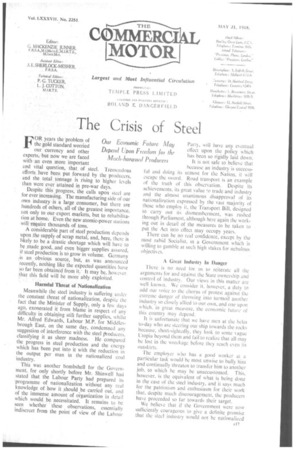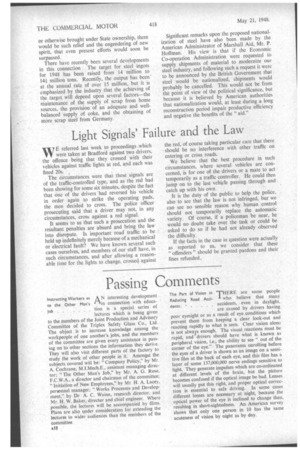The Crisis of Steel
Page 19

Page 20

If you've noticed an error in this article please click here to report it so we can fix it.
FOR years the problem of the gold standard worried our currency and other experts, but now we are faced with an even More important and vital question, that of steel. Tremendous efforts.have been put forward by the producers, and the total tonnage is rising to higher levels than were ever attained in pre-war days. Despite this progress, the calls upon steel are for ever increasing. The manufacturing side of our own industry is a large consumer, but there are hundreds of others, all of the greatest importance, not only to Our export markets, but to rehabilitation at home. Even the new atomic-power stations will require thousands of tons.
A considerable part of steel production depends upon the supply-of scrap metal, and, here, there is likely to be a drastic shortage which will have to be _made good„and eyen bigger supplies assured, it steel production is to grow in volume. Germany is an obvious source, but, as was announced recently, nothing like the expected quantities have so far been obtained from it. It may be, however. that this field will he more ably exploited. • . Harmful Threat of Nationalization Meanwhile the steel industry is suffering under the constant threat of nationalization, despite the fact that the Minister of Supply, only a few days ago, exonerated it from blame in respect of any difficulty in obtaining still further supplies, whilst Mr. Alfred Edwards, Labour M.P. for Middlesbrough East, on the same day, condemned any suggestion of interference with the steel producers. classifying it as sheer madness. He compared the progress in steel production and the energy which has been put into it with the reduction in the output per man in the nationalized coal industry.
This was another bombshell for the Government, for only shortly before Mr. Shinwell had stated that the Labour Party had prepared its programme of nationalization without any real knowledge of how it should be carried out, and of the immense amount of organization in detail which would be necessitated. It remains to be seen whether theseobservations, essentially indiscreet from the point of view of the Labour Party, will have any eventual effect upon the policy which has been so rigidly Laid down: it is not safe to believe that because an industry is successful and doing its utmost for the Nation, it will escape the sword. Road transport is an example of the truth of this observation. Despite its achievements. its great value t_o trade and industry and the almost unanimous disapproval of its nationali7ation expressed by the vast majority of those who employ it, the Transport Bill, designed to carry out its dismemberment, was rushed through Parliament, although here again the working out in detail of the measures to be taken to put the Act into effect may occupy years.
There can be no real confidence, except by the most rabid Socialist, in a Government which is willing to gamble at such high stakes for nebulous objectives.
A Great Industry In Danger There is no need for us to reiterate all the arguments for and against the State ownership and control of industry. Our views in this matter are well known. We consider it, however, a duty to add our voice to the chorus of protest against the extreme danger of throwing into turmoil another industry so closely allied to our own, and one upon which. in great measure, the economic futurL, of this country may depend.
. It is unfortunate that we have men at the helm to-day who are steering our ship lowards the rocks because. short-sightedly, they look to some vague Utopia beyond them and fail to realize that all may be lost in the wreckage before they reach even its outskirts.
The employer who has a good worker at a particular task would be most unwise to bully him and continually threaten to transfer him to another job, to which he may be unaccustomed. This, however, is the equivalent of what is being done in the ease of the steel industry, and it says much for the patriotism and enthusiasm for their work that, despite much discouragement, the producers have proceeded so far towards their target.
We believe that if the Government were now sufficiently courageous to :live a definite promise that the steel industry would not be nationalized or otherwise brought under State ownership, there would be such relief and the engendering of new spirit, that even present efforts would soon be surpassed.
There have recently been several developments in this connection The target for steel ingots for 1948 has been raised from 14 million to 14i million tons. Recently, the output has been at the annual rate of over 15 million, but it is emphasized by the industry that the achieving of the target will depend upon several factors—the maintenance of the supply of scrap from home sources, the provision of an adequate and wellbalanced supply of coke, and the obtaining of more scrap steel from Germany. Significant remarks upon the proposed nationalization of steel have also been made by the American Administrator of Marshall Aid, Mr. P. Hoffman. His view is that if the Economic Co-operation Administration were requested to supply shipments of material to modernize our steel industry, and following such a request it were to be announced by the British Government that steel would be nationalized, shipments would probably be cancelled. This would not be from the point of view of the political significance, but because it is believed by American authorities that nationaliiation would, at least during a long reconstruction period impair productive efficiency and negative the benefits of the "aid."












































































